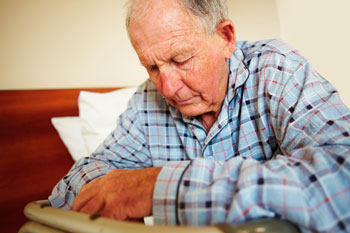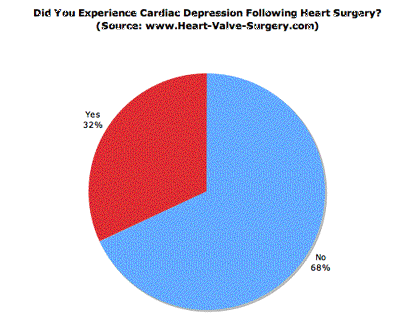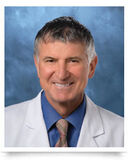“How Long Were You In Cardiac Depression?” Asks Mark
By Adam Pick on May 6, 2010
I just received a great question from Mark that relates to cardiac depression after heart valve surgery.

Mark writes, “Adam – Thanks for your book and website. It’s pretty amazing what you have done for so many patients who need heart valve surgery. As for my question, I am nine weeks post-surgery. I feel like my mental health is declining due to the operation (and other family issues). I’m having more bad days than good days. I’m curious… How long were you in cardiac depression? Thanks, Mark”
As Mark alludes, cardiac depression is a post-operative condition that can impact heart surgery patients. During my research, I learned that the onset of cardiac depression can be immediate or delayed (by weeks or even months) after surgery.
Regardless of when cardiac depression manifests, reports suggest that between 30% to 75% of patients can experience feeling anxious or depressed after surgery. During my own survey of former heart valve surgery patients, 32% of respondents said they experienced some form of cardiac depression.

As for Mark’s question, “How long does cardiac depression last?”, I have yet to find a clinical answer.
However, Doctor R. Scott Mitchell, professor of cardiovascular surgery at Stanford Hospital and Clinics, notes, “I think there is a strong incidence of acute postoperative depression, which uniformly resolves in a period of weeks… I think the cause is entirely unknown, but it could be the psychological effect of anticipating surgery, the prolonged time under anesthesia, or the result of the heart-lung machine.”
Personally, my experience with cardiac depression after aortic valve replacement lasted about six weeks and boy-ooh-boy was it a doozie. Thankfully, one month after surgery, my support group noticed the profound shift in my emotional outlook (from optimism to pessimism) and ongoing consumption of Vicodin. Thereafter, my concerned family — not my medical team — quickly sought help in the form of a pain management specialist and I started a great cardiac rehabilitation program.
Although I was not able to provide Mark with a definitive answer to his question, I hope the information above provides some additional insight into the topic of cardiac depression. If you experienced cardiac depression, perhaps you can share your experience relative to the question, “How long were you in cardiac depression?” Simply scroll below to leave a comment.
In advance, thanks for your thoughts!
Keep on tickin!
Adam
|
MJ Samer says on May 6th, 2010 at 7:01 pm |
|
I had heart valve replacement surgery last Oct. (my 3rd open heart surgery) and didn’t really experience cardiac depression, but I had some anxiety, esp. during the night at the hospital and shortly after I got home in the first few weeks. Sort of “the long, dark night of the soul” feeling, but that passed as I started feeling better physically. I think besides the things Dr. Mitchell mentions above, losing independence adds to the feeling of depression or frustration as we aren’t our old selves and have to depend a lot on others. I needed help showering, washing my hair, etc. at first and couldn’t drive a car or even sit in the front seat for many weeks. My husband was a great care giver and cheerleader and I had other support, too, but I kept wanting to get well faster — and the body resists, so that can contribute to the “bad day” feelings, too. The best advice is patience or, get help, as you did, Adam. Cardiac Rehab. is also a help and just trying to focus on the positive. There are so many good things that come out of heart surgery…a renewed appreciation of life and loved ones, for example. Joining “Mended Hearts” groups can help people, too. |
 |
|
Joanne Harris says on May 6th, 2010 at 10:56 pm |
|
Hi Mark, |
 |
|
Marge Wright says on May 7th, 2010 at 4:40 am |
|
This question is of great concern of mine as I anticipate aortic valve replacement surgery in the near future. I am a 74 year old widow, have lived happily alone now after 20 years, and |
 |
|
Kerrigan says on May 7th, 2010 at 11:30 am |
|
I was VERY lucky, with the great family and friends support, I escaped the feared depression. |
 |
|
Teresa Smitj says on May 8th, 2010 at 10:48 am |
|
I am going for heart vaule replacement in the next week Your news letter has been great help in answering my questions, My problem is that I have had trouble finding your book the local book stores say it is no longer in print so I can not get it here. I am checking on line though. Thanks for all the information. Teresa |
 |
|
Adam Pick says on May 8th, 2010 at 11:07 am |
|
Hi Teresa, Thanks for the kind words. So you know, my book has never been available at bookstores like Borders, Barnes and Nobles, etc. I tried to get the book into those chains but their purchasing managers told me they couldn’t sell enough copies to make a profit given their overhead costs. For that reason, I have always sold the book direct through this website and Amazon.com. But, even Amazon is making this difficult as of late. They never order enough books – it’s been “sold out” three times this year – and they charge lot of money to make the book available at their website. If you want to purchase the book direct, you can click here: https://www.heart-valve-surgery.com/order.php I hope that helps! Keep on tickin! |
 |
|
Kathy J says on May 8th, 2010 at 3:31 pm |
|
I was diagnosed with depression long before I had my aortic valve replaced this past February. I have noticed that the antidepressant I have taken for the past year has stopped working, and I wonder if the anesthetic they used caused it to stop working. I have been having some really rough days and some really good days. The anesthetic I was given also messed up my appetite as I could not eat hardly anything for a week and a half after my surgery without getting horribly nauseated. I see my doc soon so I am going to ask about that. Interesting thread! |
 |
|
Marlane Holtshouse says on May 8th, 2010 at 5:30 pm |
|
Hi Mark, I had my aortic valve replaced last August and finished cardic rehab in Nov. I have been doing really well but lately have been very weepy. I think it is because you are so involved in getting better and have the support of so many people and then boom, all of a sudden people realize that you are doing well and think you are a OK. Just like every thing else they just forget that perhaps you still need support. You just have to get going and get busy. I was wondering if any one else has had this problem after quite a bit of time after surgery? Good Luck, Marlane |
 |
|
Mark Reid says on May 10th, 2010 at 4:49 am |
|
Hi to all those who have taken the time to comment and provide some valuable advice. This was my 2nd aortic valve replacement and I have come to realize that many factors resulted in my cardiac depression. On my 5th day post surgery, I received the devastating news that my Mother had passed away. I pleaded with my cardiologist and surgeon to discharge me early so that I could attend my Mother’s funeral which was in another state. 3 weeks later, my Grandfather passes away as well. To cut a long story short, I missed out on cardiac rehab and ended up living with my Dad who was struggling with the loss of his wife of nearly 45 years. In a sense, I became caregiver for him for many weeks. In an attempt to stay strong for so long, grief hit me at the 9 week mark and my world turned into a downward spiral. I seeked therapy and was given anti-depressants and even though I am still battling with depression, I now see a glimmer of light of what has been an almighty long tunnel. I will continue to remain patient and stay positive and know that some day, life will become normal again and I will regain happiness once more. If anyone wishes to have a chat with their owns concerns or discuss other measures that I have taken to get through this battle, then please contact me on markpeterreid@hotmail.com |
 |
|
BarbaraS says on May 13th, 2010 at 1:27 am |
|
I was in cardiac depression for about 6 to 8 weeks. What didn’t help is that I had a husband at home that had multiple sclerosis and he was quite absorbed in his condition and had no support for me. It’s only when I return to work that I starting feeling better. In retrospect I believe that if I would have attended a cardiac rehab center, my outlook would have been better. |
 |
|
sue says on May 13th, 2010 at 3:36 pm |
|
the most helpful comments i heard re: feeling blue and/or anxious after heart surgery was ‘this is NORMAL”. this is your body reacting to a huge trauma. as my doctor said, ‘there is nothing more traumatic you can do to your body than to have your heart cut open–your system remains in fight or fllight mode.’ so take it day by day–i know from experience that is hard to do. know in advance that some days will be good days and some won’t be. the fact that you feel lousy one day after feeling pretty well for a week doesn’t mean anything bad is happening –this is just the nature of recovery. try to be patient with yourself both how you feel physicall and emotionally. i found that the stuff for sleep my dr. almost insisted on giving me was making me feel lousy also–that anti-anxiety medication is a ‘downer’. i did better without medication, but that is just me. the idea that you can’t recover from feeling depressed without intervention and medication was not the case for me. i just had to get well and stop being too tired to do anything. it just takes time and LOTS of it. |
 |
|
lysa cobb says on May 16th, 2010 at 6:44 am |
|
Its been 4 yrs i had a double bypass and i still have bad days , i was 46 and a female construction worker i no longer work in the construction field because i can’t stand the different weather temp change, i was unable to get help due to insurance change right after surgery, it seemed when the doctor said no stress the powers that be came crashing down . I now work in a rewarding job dealing with young adults but the money and the stress factor are horrible. My health is fine right now, im thankful to wake up each morning and be able to move around and still enjoy life. My main problem is to realize that i no longer have the energy to do the things that i love to do so i sleep alot and work alot . Its always good to chat with someone who has gone though something you have experienced. clolasbabes@gmail.com |
 |
|
Terry says on November 1st, 2010 at 7:07 pm |
|
Hi Adam, I had mitral valve replacement surgery with a mechanical valve replacement performed early in March. After reading your account of your cardiac depression and reading the statistics of it, as a whole, I was relieved that I had been spared. That was a few months ago. Recently. it was pointed out to me that the reason that I have lost interest in my profession might be due to just that, cardiac depression. I have been taking Wellbutrin for depression for the last several years, due to other health issues, so I sort of thought I was “depression proof”. I was so certain of this notion that I didn’t even recognize the most classic symptoms when they were occuring in me. I had lost interest in my profession and in addition, I couldn’t sleep and found the idea of any sort of competition, no matter how small, to be simply unbearable. I can’t say how long this lasts, because I am not sure I am entirely over it. I am comforted to learn that it is in its own way, self-limiting. |
 |
|
Amber says on October 4th, 2011 at 3:02 pm |
|
i have been really struggling to get back to “normal”. i am only 33yrs old. i had mitral valve replacement in May 2011. i know i was extremely anxious and depressed before traveling for surgery as it meant i had to leave my 2 kids (one 3 yrs and the other 9 months) back home and travel alone with my husband. the surgery and its recovery process as we all know is quite physically and mentally daunting. Anyhow during this time i had great support from my husband who was there with me day and night. However when we got back home, approx 3 weeks after my open heart surgery i was allowed only 2 weeks of recovery period (due to life circumstances). 5-6 weeks post op i was literally cooking steaks for dinner parties and up for all the night shifts for my 2 kids ( i had an assistant to help me weight bear – but that is all that she did). 2 months post op i was living a totally normal life. cooking, cleaning, chopping, kids, guests, and all the chores that come along with it. by 3 months i was driving and full weight bearing; and getting back to my home business. i am now 4 months plus post op and i feel at total total burn out. i am exhausted. i get up at about 5am everyday, and by the time i sleep it is almost 11pm daily. with the night shifts for the kids i hardly get 2 hrs at a stretch during those 5-6hrs. i have severe pain in all my body muscles and have to drag myself all day. my right side of chest (i had thoracotomy) has started to pain again, with my 2nd and 3rd intercostals extremely tender. if my kids accidently bump against me, i scream with pain. i cant remember anything at all. i am a surgeon my profession, and now i cant even seem to remember simple things like where i put my bag, or how much money i have in my wallet. i get very irritable with my kids. and whats worse is that i still feel short of breath and have palpitations after surgery. my daily efficiencies are down down down; and that is not the type of person that i used to be. i feel miserable.and i feel sad i also do pass blame onto my family for their lack of support at a time when i needed it the most. i also have a lot of anger against them for throwing back statements at me like: god your only 33yrs, when will these symptoms end? when will all this psychological pressure of your surgery end? i am having a very hard time coping my kids keep me going can someone please help me put things into perspective i really need help here |
 |
|
Terry says on October 4th, 2011 at 5:05 pm |
|
Dear Amber, Your letter left my heart aching for you and for what you are going through. Undergoing this sort of surgery is impossible for others to imagine. The fact that any of us come out of it alive is a marvel. We awake from the anesthesia relieved, relieved that we are still alive and that we got through it. We may be in pain, but we kind of expected that. The drugs they give us in recovery help a lot. But what happens after we get home? In your case, there seems to be a perfect storm of issues that have complicated your recovery. My surgeon cautioned me that a minimially-invasive surgery such as yours often results in more pain than a traditional sternotomy. It was because of this and the longer time on bypass required, that we chose sternotomy. Chronic pain can really darken a person’s mood and outlook and I am sorry you are enduring just such pain. Only you know how deeply it hurts. The fact that friends and family seem to assume that all is rosy since the worst part is over have no concept of the misery that endures. As a self-motivated individual, you cannot imagine that anything could drag you down like this, but drag you down it has, and all they can offer is, “Why can’t you be over this?” I have a little bit of anger toward them myself, right about now. I love what you said about your kids being the thing that keeps you going. It is that love for them that will keep your heart from deepest despair. I wonder if your muscle aches, irritability and memory difficulties could be due to lack of oxygen, since you mention being short of breath. Now, certainly lack of sleep can also explaiin some of this, but the palpitations you describe are what are most striking. An irregular heartbeat is not uncommon following open-heart surgery as I was to discover after my heart rate became erratic a few months after my surgery. My cardiologist diagnosed an atrial flutter. After different pharmaceutical remedies were tried and failed, he recommended DC Cardioversion, quite literally shocking the heart back into rhythm. I underwent this procedure last November and I am pleased to report that it was a success. But your problem goes deeper, and it is not your fault. I thought I had beaten cardiac depression, but found I was wrong. Your depression, on the other hand, may have started with your surgery, but external factors have made it something unbearable. If you have never let yourself believe that you might need antidepressants, might I suggest that you reconsider? And if you have been taking one, perhaps a different dosage or a different one altogether would be in order. You are not in this alone. We are here with you. Sometimes an advice columnist advises a reader to show their letter to the person or people they feel are part of the problem. Could this advice be helpful to you? Please keep us updated on your condition. You have a lot of healing still to do. Best Always, Terry |
 |
|
Marcy says on March 26th, 2012 at 3:04 pm |
|
I’m a 27 year old with 3 weeks post open heart surgery.I noticed that my depression came until I got home…that’s when the REAL depression started. I guess it has to do with not being able to do what I was used to before the surgery. Missing out on activities I had planned really affected me, as well as coming to terms with my scar at my age. I do feel miserable.There are good days and bad, but some days I can’t even listen to someone telling me something good about their lives because it makes me think how I am not going through anything positive in my own life. Maybe it’s too recent but I do hope this will pass because now I am the opposite of who I used to be before the surgery. I used to be positive, upbeat, fun and now I am anything but these things. I wanna go back to being me and being able to look at my scar and wear anything I want to without feeling terribly ugly. |
 |
|
Dina says on August 3rd, 2012 at 4:30 pm |
|
Hi Adam, Thanks, |
 |
|
sandie says on August 14th, 2012 at 1:42 pm |
|
I know exactly what you are feeling. I had alot of very depressed days where it felt like noone understood, would I ever feel better, and is my life always going to to be this way now. I am here to tell you IT GETS BETTER. I am 44 year old recovering from a Motro Valve Repairment. I have to go in this week for more tests due to complications. Its scarry and weird – but it ok. I promise you will feel better. Reach out to people – cry if you need to – but get moving. It helps. Write anytime and I will be happy to listen – I get it…. 🙂 Sandie |
 |
|
Nicci says on October 3rd, 2012 at 12:19 am |
|
I am 9 weeks post-op, I am only 25 and I now have a mechanical aortic valve. I didn’t know that it would be this hard. The depression has really hit me hard. I feel like it’s hard to reach out to friends and family because they do not understand how I feel. I have just started letting my friends back in, I know that sounds horrible but I get very upset when I have to hear about them moving on with out me. I know it sounds so selfish. I also wish I could find someone that is around my age that is going through this. At this point it would just be nice to have someone to talk to that understands it all. After reading a lot of the post I do know there is a light at the end of the tunnel, but any advice, or words of wisdom would be nice. Thanks for letting me vent. |
 |
|
Joyce Baker says on January 7th, 2013 at 7:31 pm |
|
The depression has been the hardest part of recovery – it causes me to think that I am not going to get better – I am 7 weeks open heart for aortic valve replacement – do complications occur more often se veral months after surgery – seems so according to what i am reading. |
 |
|
Terry Cole says on January 21st, 2013 at 7:55 pm |
|
Hello, Joyce- I am so sorry to hear of your post-operative depression. It is still a mystery what causes these symptoms. Mine, if any, was only mild, though I had been on Wellbutrin for a number of years prior to surgery. Perhaps this helped. I had mitral valve replacement surgery (mechanical) nearly three years ago and yes, there were a couple of complications. The ones directly attributable to the surgery were an erratic heart rhythm that could not be controlled with medication and pericarditis. My arrhythmia was corrected with DC cardioversion eight months after surgery. About a year after that, I developed pericarditis and spent a few days in the hospital while they confirmed the diagnosis and formulated treatment. I am pleased to report that there have been no other difficulties with my heart since then. As you are concerned about complications, I am sure that you will want to keep a close eye on things. I got myself an Omron HEM-650 blood pressure gauge to keep an eye on my bloood pressure and heart rate (it even detects and indicates arrhythmia.) You can find many such devices at your pharmacy or online. Good luck to you. Be vigilant, but be glad you had the surgery. It saved your life. Sincerely, Terry Cole |
 |
|
Sean Kupisz says on November 4th, 2015 at 8:01 pm |
|
Hello all. I had double bypass in March this year. I am 49, and I started going to college in September. My depression is a major problem. I have difficulty remembering how to do math problems, I’m doing them over and over and over, and at test time, my mind goes blank. I am going to tutoring every day. I get glimpses of what I was like before the surgery, and I can’t understand what the hell is wrong with me. I know it is depression, and I’m taking new meds, and I’m going to therapy, but my therapist is not working out. Because of my personality change, my girlfriend who has been through all of this with me and supports me in every way possible is suffering because of my behavior. Her patience is running out, and so is mine. She tells me that I am a different person. I feel like a different person. I am rambling because I have so much to say, but no time to organize and say it. I have to get back to struggling with my homework. I appreciate all that I have read here, and I feel like I am not alone. I hope that my scattered post isn’t confusing. I will contribute more as time will allow me. Thank you all so much. Sean |
 |
|
Val Clemens says on May 8th, 2018 at 10:16 am |
|
Hello it’s four weeks since my aortic valve surgery and I have the most wonderfull caring person to help me and I feel so lucky but this past 24hours I feel so sad and fuzzy headed … and am now starting to have pains in most joints in my back… I am 72 and really normally full of life and young at heart I hate to ask this but can my age play a part in my recovery time ?Thankyou.for all your supportive comments when I read through your pages.. |
 |













